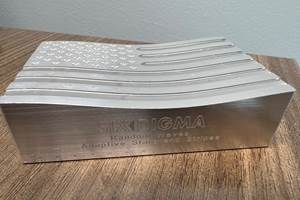Virtual Tools For Real Training
In machine shops across the nation, operators increasingly rely on virtual part data instead of blueprints. Given their prowess in manipulating three-dimensional objects and simulating mechanical operations, why couldn't computers also be used to provide aspiring metalworkers with their own pre-flight training?
Share





The computer's ability to simulate tangible objects and processes has provided a dramatic boost to many fields of human endeavor. While astronauts have received flight training via computerized simulators for many years, the delicate work of surgeons is increasingly guided by computerized representations of the human body. As computer technology has improved dramatically in recent years, virtual environments have attained a level where they faithfully represent real-world conditions.
In machine shops across the nation, operators increasingly rely on virtual part data instead of blueprints. Given their prowess in manipulating three-dimensional objects and simulating mechanical operations, why couldn't computers also be used to provide aspiring metalworkers with their own "pre-flight training?"
Answering this question formed the rationale behind the recent introduction of Tooling University by Jergens, Inc. (Cleveland, Ohio). Accessible at , ToolingU provides Web-based instruction that can serve as a prerequisite for hands-on training in various metalworking skills. This online training program employs audio, text, illustrations, photographs and full-motion video to provide detailed instruction.
Courses currently available include Workholding, Metal Cutting, Materials, Metal Forming, Material Handling and CNC. Each course requires 3 to 5 hours of instructional time, and all courses include online quizzes and tests. Instruction is available for participants at the beginner, intermediate or advanced level. At least one instructor is assigned to each department, and each department has a chairperson who personally chooses the instructors and oversees the content of all courses. To get answers for course-related questions, students can communicate with instructors or fellow students via e-mail, message boards and chat rooms. When a student successfully completes a course, he or she receives a certificate of completion to document this training.
The minimum connection requirement for running this training program is a 28.8 modem with Netscape Navigator 4.0 (or greater) or Microsoft Internet Explorer 4.0 (or greater). For those who have slower Internet connections, the program includes a supplemental CD-ROM that allows multimedia files to run from the CD instead of the Internet. But even when the user's computer system does not support audio or full-motion video, the online course material is still functional.
Specific departments of the ToolingU curriculum are sponsored by major equipment and service suppliers to the manufacturing industry. For example, Jergens sponsors the Workholding department, Valenite Inc. (Madison Heights, Michigan) sponsors Metal Cutting and Castle Metals (Franklin Park, Illinois) sponsors Materials.
The program is designed to overcome some key obstacles that have discouraged in-house training in the past. For example, instead of being obligated to remove a trainee from his or her job duties for a large block of time, employers can schedule shorter training sessions that are less disruptive to their daily operations. This is possible because the online training program enables participants to stop at any point and then continue when additional time is available. This program also eliminates the expenses associated with sending employees to remote training facilities. Unlike classroom training that relies on printed materials that may become outdated, online information is updated as quickly as the technology changes. Employers have the option of purchasing classes either by the instructional hour or by the department.
Like a flight simulator for a pilot-in-training, the ToolingU curriculum is designed to lay the groundwork—not to replace—actual hands-on experience. In this regard, it's very important for employers to arrange shop-training sessions to complement a trainee's online instruction. As a rule, trainees who have completed the online course material are better prepared to get the most from their shop experiences.
Online training can be a valuable tool for employers who don't have the time or resources to utilize traditional training programs. When combined with hands-on apprenticeship programs in the shop, computer-based instruction gives employers the means to provide complete in-house training. This represents another resource in the ongoing challenge to train the metalworkers of tomorrow.
Related Content
Building Machines and Apprenticeships In-House: 5-Axis Live
Universal machines were the main draw of Grob’s 5-Axis Live — though the company’s apprenticeship and support proved equally impressive.
Read MoreFinding the Right Tools for a Turning Shop
Xcelicut is a startup shop that has grown thanks to the right machines, cutting tools, grants and other resources.
Read MoreShop Tour Video: You've Never Seen a Manufacturing Facility Like This
In the latest installment of our “View From My Shop” series, explore Marathon Precision’s multi-process approach to manufacturing, where blacksmiths and hand-forged dies meet state-of-the-art CNC machining. Discover how restoring classic muscle cars and building custom art projects creates a dynamic shop culture — and draws top talent to this unique and innovative metalworking facility.
Read MoreWorkholding Fixtures Save Over 4,500 Hours of Labor Annually
All World Machinery Supply designs each fixture to minimize the number of operations, resulting in reduced handling and idle spindle time.
Read MoreRead Next
Last Chance! 2025 Top Shops Benchmarking Survey Still Open Through April 30
Don’t miss out! 91ÊÓƵÍøÕ¾ÎÛ's Top Shops Benchmarking Survey is still open — but not for long. This is your last chance to a receive free, customized benchmarking report that includes actionable feedback across several shopfloor and business metrics.
Read MoreAMRs Are Moving Into Manufacturing: 4 Considerations for Implementation
AMRs can provide a flexible, easy-to-use automation platform so long as manufacturers choose a suitable task and prepare their facilities.
Read MoreMachine Shop MBA
Making Chips and 91ÊÓƵÍøÕ¾ÎÛ are teaming up for a new podcast series called Machine Shop MBA—designed to help manufacturers measure their success against the industry’s best. Through the lens of the Top Shops benchmarking program, the series explores the KPIs that set high-performing shops apart, from machine utilization and first-pass yield to employee engagement and revenue per employee.
Read More





















